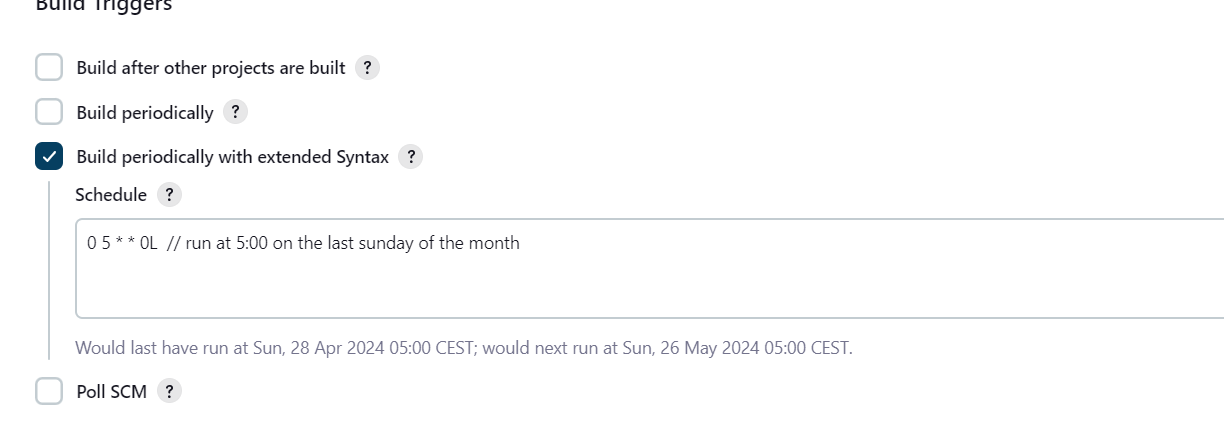This plugin adds another timer based trigger to jobs. It has an extended syntax that allows for better scheduling of weekly or monthly triggers. It also allows to define the timezone multiple times in the list and you can specify parameters to be passed for executions.
In your job you will find a new trigger Build periodically with extended Syntax.
You can add one or more cron like entries with the 5 fields
Minute Hour Day-of-Month Month Day-of-Week
You can use the same syntax as for the Jenkins provided Build periodically but also an extended syntax to e.g. run a job on the last day of a month, or only on the second Tuesday, or on the last weekday.
In the extended syntax the special character H has limited support. It can only be used standalone or in combination with a range e.g. H(0-4)
| Field | Allowed Values | Allowed Special Characters | Comment |
|---|---|---|---|
| Minutes | 0-59 | , - * / H | |
| Hours | 0-59 | , - * / H | |
| Day-of-Month | 1-31 | , - * / ? L W | |
| Month | 1-12, JAN-DEC | , - * / H | case doesn't matter |
| Day-of-Week | 0-7, SUN-SAT | , - * / ? L # H | 0 or 7 is sunday, case doesn't matter |
| Char | Description |
|---|---|
| * | Matches all values of the field. E.g. * in the minute field means every minute. |
| ? | Stands for 'no specific value' and is allowed for the Day-of-Month and Day-of-Week fields. It is used instead of the asterisk (*) for leaving either Day-of-Month or Day-of-Week blank. |
| - | Used to define ranges. E.g., 10-12 in the hour field means the hours of 10, 11, and 12. |
| , | Used to separate items in a list. E.g., MON,WED,FRI in the Day-of-Week field means the days Monday, Wednesday, and Friday. |
| / | Used to indicate increments. E.g. 0/20 in the minutes field means the seconds 0, 20 and 40. 1/4 in the Day-of-Month field means every 4 days starting on the first day of the month. |
| L | Short for "last" and can be used in the Day-of-Month and Day-of-Week fields. The L character has a different meaning in the two fields. In the Day-of-Month field, it means the last day of the month. In the Day-of-Week field, it means 6 or SAT. If used in the Day-of-Week field after a number, it means the last xxx day of the month. E.g., 6L in the Day-of-Week field means the last Saturday of the month. |
| W | Stands for "weekday" and is only allowed for the Day-of-Month field. The W character is used to specify the weekday nearest to the given day. E.g., 10W in the Day-of-Month field means the nearest weekday to the 10th of the month. If the 10th is a Saturday, the job will run on Friday the 10th. W can be combined with L to LW and means last weekday of the month. |
| # | Can only be used in the Day-of-Week field. Used to specify constructs. E.g., 5#3 means the third Friday of the month. |
| H | Stands for a random value (based on the hash of the job name). Must be used standalone or in combination with a range e.g. H(0-4). In the Day-of-Month field values are chosen in the 1-28 range. |
To define parameters that should be passed to a schedule start the next line with a % followed by name=value. If you want to have a parameter take a multiline value prefix the next line with %%. For better readability you might want to indent the parameter definitions. Each line after the cron spec that starts with % is interpreted as parameter until a new cron spec or timezone definition is found.
Lines starting with # are comments. You can also add comments with // after a cron entry but not in parameters. # is not allowed to make the rest of the line a comment.
0 5 L * * // run at 5:00 on the last day of the month, run in the controller timezone
0 5 LW * * // run at 5:00 on the last workday (Mon-Fri) of the month
# This is a comment
TZ=Europe/Berlin
0 5 * * THUL // run at 5:00 on the last Thursday of the month in timezone Europe/Berlin
0 5 ? * 2#3 // run at 5:00 on the third Tuesday of every month
TZ=America/Toronto
0 5 * FEB WED#2 // run at 5:00 on the second Wednesday in February, runs in timezone America/Toronto
// Reset the timezone to the controller timezone
TZ=
H 12 * * 5 // Jenkins syntax, runs in the controller timezone
H 5 * * * // run once between 5:00 and 5:59 every day, this is the standard Jenkins syntax, this can't be combined with
// L, W or #
// Schedule with parameters
0 12 L * * *
%param1=foo;bar
%param2=bar
%%baz
%param3=value // this is not a comment
Refer to our contribution guidelines
Licensed under MIT, see LICENSE

